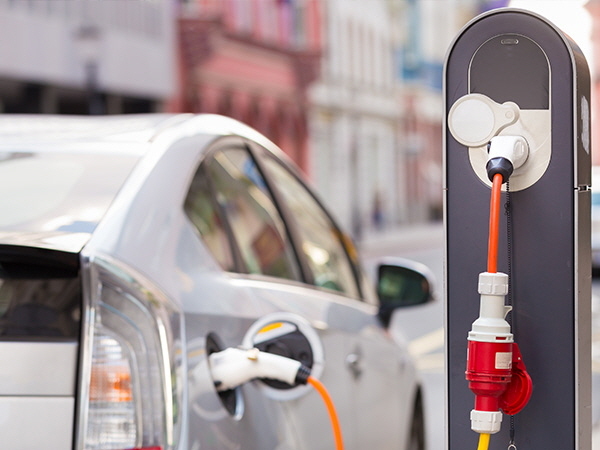The three large Korean oil refiners -- Hyundai Oilbank, GS Caltex and SK Innovation -- are seeking new opportunities in electric vehicle charging infrastructure, amid slowing sales of diesel cars and weakening profitability in the saturated gas station market.
On Monday, Hyundai Oilbank said it signed with local EV charger producer JoongAng Control and charger operator Charzin to build charging infrastructure for electric vehicles in Korea.
Under the agreement, the three firms will form a hybrid station consortium that will install and operate fast chargers at 10 gas stations and large retail stores in Seoul, Busan and Daegu by next year.
Following the pilot project, they plan to apply the business model to Hyundai Oilbank’s approximately 2,300 gas stations nationwide.
The oil refiner aims to set its business model apart from other rivals, by placing the chargers at large stores, cafes and drive-thrus, given the lifestyles of relatively younger electric car drivers.
On Monday, Hyundai Oilbank said it signed with local EV charger producer JoongAng Control and charger operator Charzin to build charging infrastructure for electric vehicles in Korea.
Under the agreement, the three firms will form a hybrid station consortium that will install and operate fast chargers at 10 gas stations and large retail stores in Seoul, Busan and Daegu by next year.
Following the pilot project, they plan to apply the business model to Hyundai Oilbank’s approximately 2,300 gas stations nationwide.
The oil refiner aims to set its business model apart from other rivals, by placing the chargers at large stores, cafes and drive-thrus, given the lifestyles of relatively younger electric car drivers.

With Hyundai’s entry into the EV charging market, competition is expected to heat up with two other oil refiners, GS Caltex and SK Energy, which had already started the business.
In May, GS Caltex embarked upon the EV charger business at its seven gas stations in Seoul. It partnered with local firms, LG Electronics and Signetev, to build related infrastructure. It is now expanding the gas stations into Busan, Gwangju and Ulsan.
SK Energy, an oil refining unit of SK Innovation, has also been operating a pilot business of EV chargers in Yangpyeong, Gyeonggi Province, since February. It completed installing 11 more chargers at its gas stations nationwide to start providing the service from August.
SK Energy plans to expand its EV charging business, deploying at its 3,570 gas stations and at around 3,500 post offices together with the state-run Korea Post.
SK Innovation CEO Kim Jun said in a press briefing in May that electric cars will “ultimately be mainstream” in the auto market, although that would come after 2030.
According to the London-based World Refining Association last year, 32 percent of survey respondents of global oil refiners said electric vehicles will have a strong influence on the demand for oil. Korea’s Environment Industry estimated the number of electric cars here would grow from 56,000 last year to 3 million by 2030.
By Shin Ji-hye (shinjh@heraldcorp.com)



















![[Today’s K-pop] Treasure to publish magazine for debut anniversary](http://res.heraldm.com/phpwas/restmb_idxmake.php?idx=642&simg=/content/image/2024/07/26/20240726050551_0.jpg&u=)